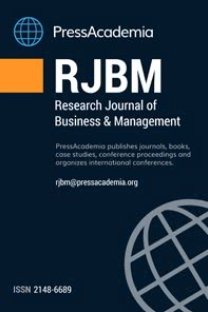Son on yılda pozitif psikolojiye yönelik ilginin artmasıyla birlikte yeni kavramların araştırmalara konu olmaya başladığını görmekteyiz. Bu çalışmada, bu kavramlardan bilinçli farkındalık ve öz-bilinç’in kişilerarası çatışma çözme yaklaşımlarındaki rollerini ortaya çıkarmak amaçlanmıştır. Kişilerarası Çatışma Çözme Yaklaşımları Ölçeği, Bilinçli Farkındalık Ölçeği ve Özbilinç Ölçeği’nin kullanıldığı araştırma, 321 üniversite öğrencisinden toplanan verilerle yürütülmüştür. Elde edilen sonuçlar, bilinçli farkındalık ile birlikte öz-bilinç’in alt boyutlarında içsel öz-farkındalık, stil bilinçliliği, görünüm bilinçliliği ve sosyal anksiyete faktörlerinin yapıcı ve olumlu çatışma çözme süreçleri açısından önemli rolleri olduğunu ortaya çıkarmıştır. Elde edilen tüm sonuçlar alanyazında elde edilen bulgular ışığında tartışılmıştır. 1. GİRİŞ
The role mindfulness and self-consciouness on interpersonal conflict resolution approaches
Along with arising interest on positive psychology in the last decade, new terms are being discussed in recent studies. Among those terms, the most popular ones are related with mindfulness and awareness. The main purpose of this study was to explore possible roles of mindfulness and self-consciousness on interpersonal conflict resolution approaches. The study was conducted by a self-report data gathered from 321 university students using Interpersonal Conflict Resolution Approaches Scale, Mindful Attention Awareness Scale and Self-consciousness Scale. The results showed that mindfulness and sub-dimensions of the self-consciousness as internal state awareness, style consciousness, appearance consciousness and social anxiety have significant roles in th positive and constructive conflict resolution processes. All these findings were discussed in the light of literature
___
- Akın, A., Abacı, R., Öveç, Ü. (2007). The construct validity and reliability of the Turkish version of self- consciousness scale, Journal of Faculty of Educational Sciences, 40, 2, pp. 257-276.
- Anderson, E. M., Bohon, L. M., Berrigan, L. P. (1996). Factor structure of the private Self-consciousness Scale,
- Journal of Personality Assessment, 66, pp. 144–152. Arslan, C. (2005). Kişilerarası çatışma çözme ve problem çözme yaklaşımlarının yükleme karmaşıklığı açısından incelenmesi, S.Ü. Sosyal Bilimler Enstitüsü Dergisi, 14, pp. 75-93.
- Basım, N., Çetin, F., Tabak, A. (2009). Beş faktör kişilik özelliklerinin kişilerarası çatışma çözme yaklaşımlarıyla ilişkisi, Türk Psikoloji Dergisi, 24, 63, pp. 20-34.
- Brown, K. W., Ryan, R. M. (2003). The benefits of being present: Mindfulness and its role in psychological well- being, Journal of Personality and Social Psychology, 84, pp. 822-848.
- Carver, C. S., Humphries, C. (1981). Havana daydreaming: A study of self-consciousness and the negative reference group among Cuban Americans, Journal of Personality and Social Psychology, 40, pp. 545-552.
- Çetin, F. (2008). Kişilerarası İlişkilerde Kendilik Algısı, Kontrol Odağı ve Kişilik Yapısının Çatışma Çözme Yaklaşımları
- Üzerine Etkileri: Uygulamalı Bir Araştırma, Yayımlanmamış Yüksek Lisans Tezi, KHO Savunma Bilimleri Enstitüsü, Ankara. Fenigstein, A., Scheier, M. F., Buss, A. H. (1975). Public and private self-consciousness: Assessment and theory,
- Journal of Consulting and Clinical Psychology, 43, 4, pp. 522-527. Franzoi, S. L., Davis, M. H., Young, R. D. (1985). The effects of private self-consciousness and perspective taking on satisfaction in close relationships, Journal of Personality and Social Psychology, 48, 6, pp. 1584-1594.
- Germer, C., Siegel, R., Fulton, P. (2005). Mindfulness and Psychotherapy, New York: Guildord Press.
- Goldstein, S. B. (1999). Construction and validation of a conflict communication scale, Journal of Applied Social Psychology, 29, 9, pp. 1803-1832.
- Grant, A. M., Franklin, J., Langford, P. (2002). The self-reflection and insight scale: A new measure of private self- consciousness, Social Behavior and Personality, 30, 8, pp. 821-836.
- McGuigan, R., Popp, N. (2012). Consciousness and conflict (Explained better?), Conflict Resolution Quarterly, 29, 3, pp. 227-260.
- Mittal, B., Balasubramanian, S. K. (1987). Testing the dimensionality of the self-consciousness scales, Journal of
- Personality Assessment, 51, 1, pp. 53-68. Nan, S. A. (2011). Consciousness and culture-based conflict and conflict resolution, Conflict Resolution Quarterly, 28, 3, pp. 239-262.
- Özyeşil, Z., Arslan, C., Kesici, Ş., Deniz, M. E. (2011). Bilinçli farkındalık ölçeği’ni Türkçeye uyarlama çalışması.
- (Adaptation of the mindful attention awareness scale into Turkish), Education and Science, 36, 160, pp. 224-235. Şahin, N. H., Basım, H. N., Çetin, F. (2008). Kişilerarası çatışma çözme yaklaşımlarında kendilik algısı ve kontrol odağı, Türk Psikiyatri Dergisi, 20, 2, pp. 153-163.
- Scheier, M. F. (1980). Effects of public and private self-consciousness on public expression of personal beliefs,
- Journal of Personality and Social Psychology, 39, pp. 514-521. Ting-Toomey, S. (1988). Intercultural conflict styles: A face-negotiation theory. İçinde Y. Y. Kim, W. Gudykunst
- (Ed.), Theories in Intercultural Communication (pp. 213-235), Newbury Park, CA: Sage. Watson, P. J., Biderman, M. D. (1993). Narcissistic personality inventory factors, splitting, and self-consciousness,
- Journal of Personality Assessment, 61, pp. 41–57. Watson, P. J., Hickman, S. E, Morris, R. J., Stutz, N. L., Whiting, L. (1994). Complexity of self-consciousness subscales: Correlations of factor with self-esteem and dietary restraint, Journal of Social Behavior and Personality, 9, pp. 761–774.
- Watson, P. J., Milliron, J. T., Morris, R. J. (1995). Social desirability scales and theories of suicide: Correlations with alienation and self-consciousness, Personality and Individual Differences, 18, pp. 701–711.
- Watson, P. J., Morris, R. J., Ramsey, A., Hickman, S. E., Waddell, M. G. (1996). Further contrasts between self- reflectiveness and internal state awareness factors of private self-consciousness, Journal of Psychology, 130, pp. 183–192.
- Weinstein, N., Brown, K. W., Ryan, R. M. (2009). A multi-method examination of the effects of mindfulness on stress attribution, coping, and emotional well-being, Journal of Research in Personality, 43, pp. 374-385.
- Yayın Aralığı: Yılda 4 Sayı
- Başlangıç: 2014
- Yayıncı: PressAcademia
